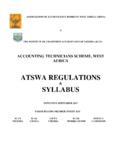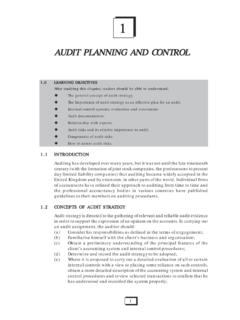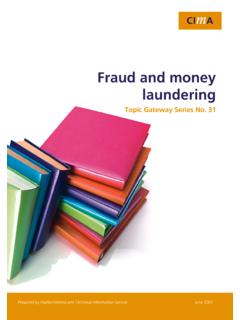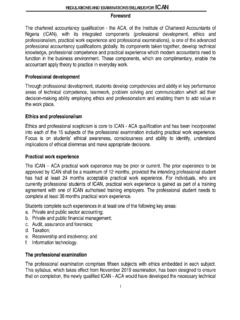Transcription of THE INSTITUTE OF CHARTERED ACCOUNTANTS OF NIGERIA
1 THE INSTITUTE OF CHARTERED ACCOUNTANTS OF NIGERIA (Established by Act of Parliament No. 15 of 1965) Effective May 2010 1 FOREWORD The INSTITUTE of CHARTERED ACCOUNTANTS of NIGERIA (ICAN) is one of the leading professional bodies in the continent of Africa with a large population of students and members. It was established by the Act of Parliament No. 15 of 1965. Due to the increasing demands for better quality CHARTERED ACCOUNTANTS in the market place, both nationally and internationally as a result of globalization, the Council of the INSTITUTE had to constitute a syllabus Technical Review Committee at its August 2008 meeting to prepare a syllabus that will be the basis for examining students commencing from the May 2010 Professional Examinations Diet.
2 The rationale for the new syllabus is to meet the challenges posed by the world being a global village so that our graduates can be well versed in knowledge, skills and professionalism to deliver seamless and excellent services to their employers and clients. The old syllabus had a five-level structure with a total of nineteen papers, while this new syllabus has a structure with a robust content, which will meet the challenges of the world economy. It has a four-level structure with a total of fifteen papers. It has not only expanded the scope and contents of the old syllabus but has introduced more of ethics and information technology as the bedrock on which to propel the examination of our students.
3 The syllabus is in compliance with the requirements of International Accounting Education Standards Board (IAESB) of the International Federation of ACCOUNTANTS (IFAC) and the World Bank Report on Observance of Standards and Codes (2004). The Foundation Level is knowledge based; the Intermediate Level is skills based, while the Professional I and Professional II examinations are areas of essential and core competencies. This is in line with the INSTITUTE s current policy on specialisation of our graduates on passing the 15-paper examinations to choose a minimum of one and a maximum of three faculties of interests out of the six faculties, namely: (1) Audit, Investigations and Forensic Accounting (2) Taxation and Fiscal Policy Management (3) Consultancy and Information Technology (4) Insolvency and Corporate Re-engineering (5) Public Finance Management and (6) Corporate Finance Management.
4 Overall, this syllabus is student-friendly and will certainly meet the needs of employers of labour whether in the public or private sectors, accounting and consulting firms and training institutions. In conclusion, this new syllabus that comes into effect in May 2010 will ensure that the education and training of students are adequate and comparable with world class standards of training of Professional ACCOUNTANTS . FRANCIS OJAIDE, , FCA Chairman, syllabus Review Technical Committee 2 CONTENTS Page 1 PART ONE STUDENTS REGULATIONS AND EXAMINATION syllabus 1 Introduction .. 4 2 Objects and Duties .. 4 3 Membership .. 4 4 CHARTERED 4 5 Registered ACCOUNTANTS .. 5 6 Designatory letters.
5 5 7 The Practice of Accountancy in 5 8 Advertisements for 6 9 The Library .. 6 10 District Societies .. 6 11 Publications .. 6 12 Training Schemes .. 7 (i) Definition of 7 (ii) Approved Work of Accounting 7 (iii) Recognised Training Centres .. 7 13 Practising Licence .. 8 14 Secretariat .. 8 PART TWO 15 STUDENTSHIP REGISTRATION AND 9 Approved Qualifications for 9 Application for Registration .. 10 Conditions to be satisfied .. 10 PART THREE 16. PROFESSIONAL 12 Structure of the syllabus .. 12 Dates of Examinations .. 13 Closing Dates of Entries .. 13 Examination Entry .. 13 Examination 13 Credit System .. 13 Pass Mark .. 14 Conversion Arrangements .. 14 17 Examination Time Table For May 2010 to May 2011.
6 23 Examination Time Table For November 2011 .. 24 18 Examination Question 24 3 19 Absence from an Examination .. 25 20 Misconduct in an Examination .. 25 20 Exemption Guidelines .. 26 Academic Qualifications .. 26 Subject by Subject 26 Professional 28 Lecturers in Higher 29 PART FOUR 21 EXAMINATIONS syllabus .. 30 30 Fundamentals of Financial Accounting (FFA).. 30 Corporate and Business Law (CBL).. 34 Economics and Business Environment (EBE).. 37 45 Costing and Quantitative Techniques (CQT).. 45 Taxation (TAX).. 51 Auditing and Assurance (AAS).. 55 Business Communication and Research Methodology (BCRM).. 59 PROFESSIONAL EXAMINATIONS PROFESSIONAL EXAMINATIONS I.
7 64 Information Technology (IT) .. 64 Management Accounting (MA).. 71 Financial Accounting (FA).. 75 Advanced Audit and Assurance (AAA).. 78 PROFESSIONAL EXAMINATION II .. 82 Public Sector Accounting and Finance (PSAF).. 82 Financial Reporting and Ethics (FRE).. 87 Strategic Financial Management (SFM).. 94 Advanced Taxation (ATAX).. 99 4 THE INSTITUTE OF CHARTERED ACCOUNTANTS OF NIGERIA PART ONE Students Regulations and Examination syllabus 1. INTRODUCTION The forerunner of the INSTITUTE under the name The Association of ACCOUNTANTS in NIGERIA was established in 1960. This Association was absorbed by the INSTITUTE created by an Act of Parliament No. 15 (The Act) which came into force on September 1, 1965.
8 The INSTITUTE has, as at May 31, 2009, over twenty-seven thousand (27,000) members and One hundred and fifty-one thousand, one hundred and fourteen (151,114) students on its Register. 2. OBJECTS AND DUTIES The objects and duties of the INSTITUTE as laid down in section 1 (1) of the Act, are: (a) determining what standards of knowledge and skill are to be attained by persons seeking to become members of the accountancy profession and raising those standards from time to time as circumstances may permit; (b) securing in accordance with the provisions of the Act, the establishment and maintenance of registers of Fellows, Associates and Registered ACCOUNTANTS entitled to practise as ACCOUNTANTS and auditors and publishing same from time to time lists of those persons; and (c) performing through the Council under this Act the functions conferred on it by the Act.
9 3. MEMBERSHIP There are two main classes of membership of the INSTITUTE , namely; CHARTERED ACCOUNTANTS and Registered ACCOUNTANTS . 4. CHARTERED ACCOUNTANTS A person shall be enrolled as a CHARTERED Accountant if: (a) he/she passes the qualifying examination for membership conducted by the Council of the INSTITUTE and completes a prescribed practical training under Section 8(1)(a); or (b) he/she holds a qualification granted outside NIGERIA and for the time being accepted by the INSTITUTE , and he/she satisfies the Council of the INSTITUTE that he/she had sufficient practical experience as an Accountant under 5 Section 8(1)(b). A member of any of the approved professional bodies shall be eligible under the present Rules and Regulations of the INSTITUTE to be enrolled as a CHARTERED Accountant, in pursuance of section 8 (1) (b) of the Act after undergoing an orientation course/seminar during which Corporate and Business Law; Public Sector Accounting and Finance; Financial Reporting and Ethics; and Advanced Taxation would be the main subjects of intense discourse.
10 Furthermore, the candidate would be required to make an oral presentation before admission. These approved professional bodies are: (i) The INSTITUTE of CHARTERED ACCOUNTANTS in England and Wales; (ii) The INSTITUTE of CHARTERED ACCOUNTANTS of Scotland; (iii) The INSTITUTE of CHARTERED ACCOUNTANTS in Ireland; (iv) The Association of CHARTERED Certified ACCOUNTANTS , United Kingdom; (v) The American INSTITUTE of Certified Public ACCOUNTANTS ; (vi) The Canadian INSTITUTE of CHARTERED ACCOUNTANTS ; (vii) The CHARTERED INSTITUTE of Management ACCOUNTANTS , United Kingdom; and (viii) The CHARTERED INSTITUTE of Public Finance and Accountancy, United Kingdom. 5. REGISTERED ACCOUNTANTS A person is entitled to be registered as a Registered Accountant if he/she satisfies the Council of the INSTITUTE that immediately before the appointed day ( September 1, 1965), he/she has had not less than five years experience as an inspector and auditor of company affairs under the provisions of the Companies and Allied Matters Act, 1990.











